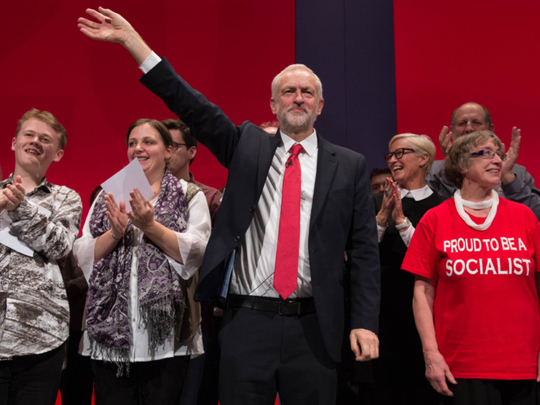
The Labour party is not split, it is splattered. The “divorcing couple arguing over the children” metaphor doesn’t work unless we accept there are countless children who don’t want to live with either parent. The battle cry of “Which side are you on, boys?” doesn’t work because we are not all boys and there are not simply two sides.
There is, instead, a babble of voices that does not cohere into one narrative. The search for a convincing story is one that I heard spoken of at the conference in Liverpool last week, but never quite found. To be optimistic, one could say that this is a party in transition and that somehow the fragments will be glued together; indeed, that fragmentation is just the nature of the modern world. But the modern world is itself something of a problem for Labour. Inside the conference, there were endless debates about the structure of the party’s national executive committee.
During those, you lose all track of time and don’t even know what year it is. This kind of navel gazing felt wrong, frankly, when subjects such as Syria and Brexit were not debated. Over the summer, it was possible to watch various Labour people arguing endlessly on Twitter and forget that there was a Tory government. Conference is like Twitter come to life: inward-looking and strangely meaningless.
One day it is possible to think that Labour is about achieving socialism in one country. The next members are told it is not against capitalism. Does it exist simply to soften the hard edges of an economic system it knows it can’t change? If so, what are the values it keeps harping on about?
Further sloganeering
Words such as “fairness” and “equality” and “freedom” and “opportunity” are used by every party. The language of anti-austerity is further sloganeering. It is a sentiment not a policy. During the last election several voters asked me what austerity meant. In a way, the discussions that Momentum were having were trying to articulate the values that define Labour. It was all a bit back-to-basics, and felt like a school fete in north London.
Momentum is a mishmash of sensibilities, but any comparison with Militant is overblown. One look at the clothes would tell you that. Militant knew that working-class people didn’t want to look poor; Momentum is more baggy in every sense. It’s a strange mix of the past and the future. They are keen on networks and automation, which is a world away from the mutterings of some union bosses. The attitude to work is different; as is the attitude to Trident and fracking.
The Momentum crew are less good at explaining who will do the work of caring in the future because they have zilch in the way of gender politics beyond loving sex workers. They have energy but the beatification of Jeremy Corbyn is not enough to generate a coherent philosophy. For he is simply a cipher, too often a regurgitator of policy-lite platitudes. His limitations are sold as his USP. Actually, he reminds me increasingly of Blair, a man who believed above all in his own self-righteousness.
Like former prime minister Tony Blair, he surrounds himself with the ‘Live Tory-Vote Labour’ types who live in big houses and send their children to selective schools. He is merely a symptom of a problem, not the problem itself. Is Labour simply the Retro party? Parts of it look back to the glory days of when the party lost the miners’ strike; others to that time when Labour won elections.
What it cannot do is offer an account of where we are now. God knows, that is difficult ... but we do not yet live in this world of robots. We live in a scary, insecure world. The challenges to neoliberalism have come from the Right — United Kingdom Independence Party leader Nigel Farage or Republican presidential candidate in the United States Donald Trump — and this means two things for a party of the Left. It has to present a competent economic plan and it has to make the case for social liberalism in conjunction with other parties.
Old heartlands
Now is not the time for a politics of purity or paranoid purges. This is a terrible narrowing-down. What is opening up are the divides between the places where it remains in control — the cities with Labour mayors and the Welsh Assembly — and what are referred to as the old Labour heartlands, full of small towns. It is in many of these northern English constituencies that some Corbynites plan to deselect, mostly women, MPs.
The fracturing of class solidarity means that the leadership of the party wants to hold on to what it considers to be socially conservative voters, but has no way to address them. The disdain of the Remainers for the Brexiteers made that clear. The Left regards its own people as gullible, stupid and largely suffering from false consciousness. At least Corbyn addressed this in his speech. But he needs to reach out beyond his base.
There is potential in local politics — a new kind of devolution that is evolving organically. There is still a reluctance to talk about Englishness, but national identity is up for re-imagining. It is happening. Labour can join that conversation or cede it to the Right. If Labour cannot find a way of talking about a nation that embodies modernity as well as making the case for spending on a state that makes us feel more secure, whether that’s defence or the National Health Service; if it cannot speak of a civic morality, then what is it for? The problem is not faith in Corbyn but faith in this common purpose.
— Guardian News & Media Ltd
Suzanne Moore is an award-winning columnist for the Guardian.








